https://www.freepressjournal.in/analysis/policy-watch-is-this-all-that-a-double-engine-growth-can-achieve-in-uttar-pradesh
Uttar Pradesh: A double engine policy means little if the tracks are poorly aligned
RN Bhaskar
The government is fond of talking about a double engine growth in Uttar Pradesh (UP). In the recently tabled Union Budget, it talked about a seven-engine strategy of growth.
The imagery may be appealing, but it depends on whether the tracks are properly aligned, and whether the tracks lead to the desired destination. A train chugging along on defective tracks could easily get derailed. And if the train moves to the wrong tracks, it might land up at an unwanted (or undesirable) destination.
The repudiation of this metaphor becomes more meaningful when one considers the government’s penchant for concealing information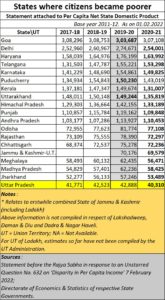 . The recently tabled Economic Survey does not have the section on statistics that was so invaluable for anyone keen on studying the Indian economy. Access to Lok Sabha and Rajya Sabha answers has become extremely difficult, if not impossible.
. The recently tabled Economic Survey does not have the section on statistics that was so invaluable for anyone keen on studying the Indian economy. Access to Lok Sabha and Rajya Sabha answers has become extremely difficult, if not impossible.
But a reply tabled by the government in the Rajya Sabha on 7 February 2022 (https://pqars.nic.in/annex/256/Au632.pdf) does help a lot. Responding to a question (No.632) by M.V.Shreyams Kumar, on the disparity of per capita income in various states, the reply was given by the Minister of state of MOSPI, Rao Inderjit Singh, was quite revealing.
UP’s low per capita numbers
A significant discovery is that contrary to a double engine growth in UP, the state has the second lowest per capita GDP growth compared to other states in India (see chart). The lowest per capita GDP was that of Bihar. But Bihar has witnessed growth in per capita 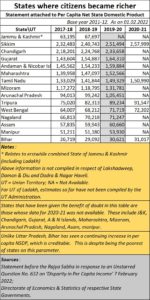 GDP year after year for the four years reviewed. This does suggest, quite emphatically, that Bihar’s economic policies are on the right track, and the per capita number has been growing.
GDP year after year for the four years reviewed. This does suggest, quite emphatically, that Bihar’s economic policies are on the right track, and the per capita number has been growing.
UP on the other hand saw per capital GDP grow for the first three years – from 2017-18 to 2019-20. But in 2020-21, this number slumped from Rs.42,888 to Rs.40,310. This was the lowest ever during the past four years.
Compare these numbers with the states which saw per capita GDP grow. Take the figures for Sikkim where per capita GDP stood at Rs257,999, or Tamil Nadu (TN) where it stands at Rs.150,990. What this means is that an individual in Sikkim got six times more that what the individual got in UP, and the man in TN got 3.7 times more than the person in UP. Neither of these states had a double engine approach. Neither of these states benefitted from Central grants the way UP did (https://asiaconverge.com/2021/04/little-governance-till-uttar-pradesh-is-tamed/). But both these states had better human development indices than UP. Both states had invested more money in their people (better education and health) than did the double engine state (https://asiaconverge.com/2021/08/the-fanciful-figures-of-uttar-pradesh/). UP’s record on literacy, health and governance is terrible, and the collapse in per capita GDP confirms this.
UP has short-sold its farmers on wheat and rice, by not ensuring a higher procurement either by state procurement agencies or the Food Corporation of India or FCI (https://asiaconverge.com/2021/08/poverty-in-uttar-pradesh-and-bihar-is-not-accidental/). Bihar, however, encouraged its farmers to move away from rice and wheat and grow corn instead, where the corruption of the FCI would not blight farm fortunes. UP, on the other, wanted farmers to sell their produce at distress prices to middlemen.
In much the same way, UP compelled its farmers to sell milk to middlemen, who in turn paid them one of the lowest prices for milk per litre in the country (https://asiaconverge.com/2022/02/budget-22-the-farmer-betrayed/). If there is any state which confirms that the government cares little for farmers, it is UP. For decades, it has resisted the call to set up milk cooperatives, which in turn can pay farmers higher prices. Instead, middlemen were protected and pampered.
India is no better
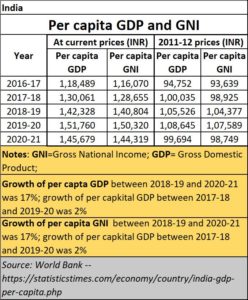 But why blame UP alone. The central government must also share the blame. It has learnt the fine art of extracting more money from its citizens even when their incomes did not grow that much. Hence, per capita GDP increased by 2%, when government revenues soared by over 12%.
But why blame UP alone. The central government must also share the blame. It has learnt the fine art of extracting more money from its citizens even when their incomes did not grow that much. Hence, per capita GDP increased by 2%, when government revenues soared by over 12%.
The government has hurt agriculture by first denying farmers compensation for the old cattle they could not sell to the trader. It has refused compensation to farmers for being forced to look after old cattle. Not surprisingly, the streets of UP and Gujarat are filled with abandoned stray cattle. It has sought to allow unwise import of edible oil (https://asiaconverge.com/2022/01/the-government-lets-down-indias-edible-oil-industry/), baned commodity trading in key products, and imposed ad hoc limits on stocking. And now it wants to interfere with NDDB (https://asiaconverge.com/2022/02/budget-22-the-farmer-betrayed/), the key institution which promoted milk cooperatives and which allowed India to become the world’s largest milk producer.
It has allowed UP to have a greater share of central funds. It has allowed the state to subvert its police to file cases against any protestor, causing even the Supreme Court to step in last week, threatening it with dire consequences if it did not immediately withdraw notices of recovery against CAA (Citizenship Amendment Act) protestors (https://www.freepressjournal.in/india/sc-raps-yogi-government-for-fining-of-protester).
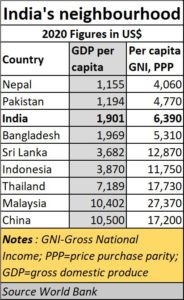 Its government was not singled out for dismissal when a minister’s son ploughed his convoy of vehicles into protesting mobs at Lakhimpur killing four protesting farmers. Instead, once again, the Supreme Court had to step in. The Supreme Court had to step in for the Unnao rape and killing as well (https://asiaconverge.com/2021/04/curse-of-being-an-abandoned-child-in-india/). UP remains the only state in India which has not submitted a report on 36 of its child shelters. This was to ensure that children were not exploited and trafficked. The state has been pampered, its crimes have been glossed over, and the common man has been exploited.
Its government was not singled out for dismissal when a minister’s son ploughed his convoy of vehicles into protesting mobs at Lakhimpur killing four protesting farmers. Instead, once again, the Supreme Court had to step in. The Supreme Court had to step in for the Unnao rape and killing as well (https://asiaconverge.com/2021/04/curse-of-being-an-abandoned-child-in-india/). UP remains the only state in India which has not submitted a report on 36 of its child shelters. This was to ensure that children were not exploited and trafficked. The state has been pampered, its crimes have been glossed over, and the common man has been exploited.
Such distorted policies and state favouritism have caused even the country’ per capita GDP to remain low when compared with most of its neighbours. When it comes to per capita GDP, only two neighbouring countries (Nepal and Pakistan) have lower per capita GDP than India. Others like Bangladesh, Sri Lanka, and China sport higher per capita GDP numbers.
Opportunities for graft
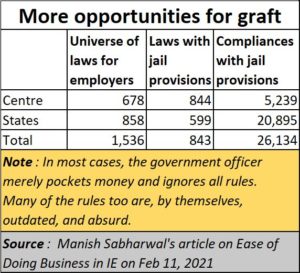 Once again, the problem comes down to governance. India’s inability to rein in the police raj is a key cause. As Observer Research Foundation pointed out in its monograph titled “Jailed for Doing Business,” India has 26,134 imprisonment clauses in its business laws. Most laws are outdated, and even absurd (like offices need to have x number of spittoons). The factory of compliance inspector can register cases against employers, and make them appear before courts which charge them a fine, or can sometimes even award prison sentences. The fact that few ever go to jail indicates that many government officers merely pocket some money and ignore all the misdemeanors. The laws become excellent excuses for demanding graft (https://asiaconverge.com/2016/12/want-to-uproot-corruption/). Right from boiler inspectors to labour officers, to officers in the Shops & Establishment department to check on misdemeanors by business establishments — all are known to extort money. That in turn causes many micro, medium and small enterprises (MSMEs) to become sick. As Manish Sabharwal pointed out in a recent article, the numbers of laws are staggering. They become the biggest incentive for promoting a parallel economy. The small businessman is exploited, and hung out to dry.
Once again, the problem comes down to governance. India’s inability to rein in the police raj is a key cause. As Observer Research Foundation pointed out in its monograph titled “Jailed for Doing Business,” India has 26,134 imprisonment clauses in its business laws. Most laws are outdated, and even absurd (like offices need to have x number of spittoons). The factory of compliance inspector can register cases against employers, and make them appear before courts which charge them a fine, or can sometimes even award prison sentences. The fact that few ever go to jail indicates that many government officers merely pocket some money and ignore all the misdemeanors. The laws become excellent excuses for demanding graft (https://asiaconverge.com/2016/12/want-to-uproot-corruption/). Right from boiler inspectors to labour officers, to officers in the Shops & Establishment department to check on misdemeanors by business establishments — all are known to extort money. That in turn causes many micro, medium and small enterprises (MSMEs) to become sick. As Manish Sabharwal pointed out in a recent article, the numbers of laws are staggering. They become the biggest incentive for promoting a parallel economy. The small businessman is exploited, and hung out to dry.
Therefore, it does not really matter whether you have two engines or seven. What is needed is that the tracks are right, ad go to the right destinations. It is not the engines that matter. It is the removal of obstacles and fair access to market and justice that are key to development and growth.
UP is a classic example of what can go wrong with India. The sooner it is set right, the better.





























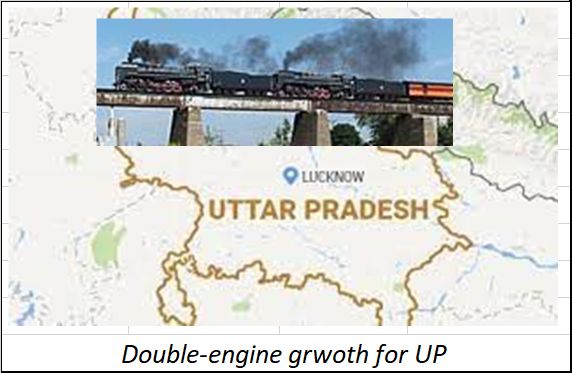






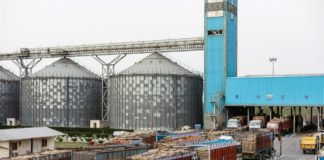
COMMENTS